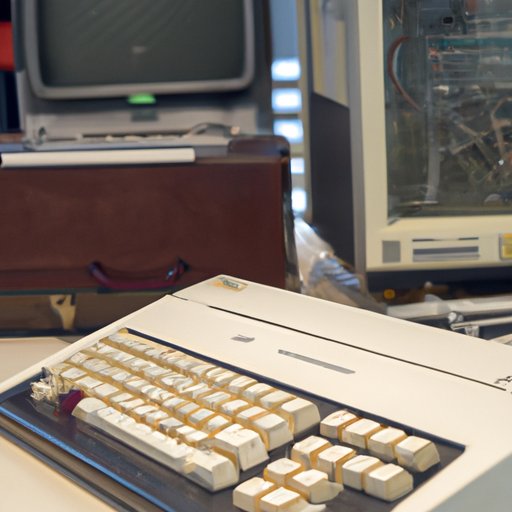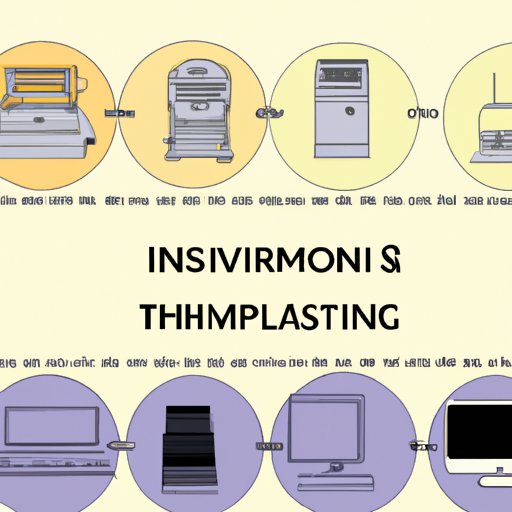Introduction
The invention of computers is one of the most important events in human history. From simple machines used for counting to powerful supercomputers capable of analyzing vast amounts of data, computers have come a long way since their earliest iterations. But when were computers invented? This article seeks to answer this question by exploring the history of the invention of computers and examining the major milestones in computer science and engineering.

A History of the Invention of Computers
In order to understand the invention of computers, it is important to look at the early innovations in computing. The first known device used for computing was the abacus, which is believed to have been invented around 500 BC. This primitive machine consisted of a wooden frame with beads strung along wires, allowing people to make calculations by moving the beads up and down the wires. Other innovations soon followed, such as the astrolabe, which was used for navigation and timekeeping, and the Jacquard loom, which was used to automate the weaving process.
However, it wasn’t until the 19th century that the invention of computers began in earnest. Charles Babbage is widely considered to be one of the pioneers behind the invention of computers. He proposed the idea of an “analytical engine” in 1837, which was essentially a programmable mechanical calculator. Although his design was never fully realized, Babbage laid the groundwork for future inventions in computing.
The Evolution of Computing: How Computers Came to Be
Since Babbage’s initial proposal, computers have evolved significantly. There have been many major milestones in computer science and engineering that have helped shape the modern computer. In 1936, Alan Turing developed the concept of a universal machine, which could be programmed to carry out any task given to it. In 1941, Konrad Zuse created the first programmable computer, the Z3, which was capable of performing basic arithmetic operations. In 1945, John von Neumann published the paper “First Draft of a Report on the EDVAC”, which outlined the principles of the modern stored-program computer.
The 1950s saw the development of the first commercial computers. IBM released the 701 in 1952 and the 704 in 1954, while UNIVAC I was released in 1951. In 1956, FORTRAN was developed, which marked the beginning of the era of high-level programming languages. In 1964, Douglas Engelbart demonstrated the first mouse-driven graphical user interface (GUI). In 1971, Intel released the first microprocessor, the 4004, which paved the way for the development of personal computers and mobile devices.
The 1980s saw the invention of the world wide web, which revolutionized the way we communicate, access information, and interact with each other. The 1990s saw the launch of the first web browser, Mosaic, and the introduction of the search engine, Google, which has become one of the most powerful tools on the internet. Today, computers are ubiquitous in our daily lives, from smartphones and tablets to enterprise-level servers and cloud computing.
Conclusion
The invention of computers has had a profound impact on society. We rely on computers for a variety of tasks, from communication and entertainment to research and analysis. This article has explored the history of the invention of computers, examining the major milestones in computer science and engineering that have shaped the modern computer. By looking back at the pioneers behind the invention of computers, we can gain a better understanding of how computers came to be and the impact that they have had on our lives.
Resources
Books about the Invention of Computers:
- The Innovators: How a Group of Inventors, Hackers, Geniuses, and Geeks Created the Digital Revolution by Walter Isaacson
- A History of Modern Computing by Paul E. Ceruzzi
- Computer: A History of the Information Machine by Martin Campbell-Kelly and William Aspray
Websites with Information about the Invention of Computers:
- Computer History Museum: https://www.computerhistory.org/
- History of Computers: https://www.britannica.com/topic/history-of-computing
- Computer Science Timeline: https://www.cs.cmu.
(Note: Is this article not meeting your expectations? Do you have knowledge or insights to share? Unlock new opportunities and expand your reach by joining our authors team. Click Registration to join us and share your expertise with our readers.)
